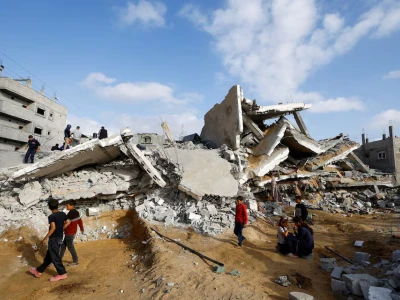
Gaza's catastrophic food shortage means mass death is imminent, monitor says
Gaza's health ministry has said 27 children and three adults have died so far from malnutrition.
CAIRO/JERUSALEM/LONDON, March 18 (Reuters) - Extreme food shortages in parts of the Gaza Strip have already exceeded famine levels, and mass death is now imminent without an immediate ceasefire and surge of food to areas cut off by fighting, the global hunger monitor said on Monday.
The Integrated Food-Security Phase Classification (IPC), whose assessments are relied on by U.N. agencies, said 70% of people in parts of northern Gaza were suffering the most severe level of food shortage, more than triple the 20% threshold to be considered famine.
The IPC said it did not have enough data on death rates, but estimated residents would be dying at famine scale imminently, defined as two people out of every 10,000 dying daily from starvation or from malnutrition and disease.
Gaza's health ministry has said 27 children and three adults have died so far from malnutrition.
"The actions needed to prevent famine require an immediate political decision for a ceasefire together with a significant and immediate increase in humanitarian and commercial access to the entire population of Gaza," it said.
In all, 1.1 million Gazans, around half the population, were experiencing "catastrophic" shortages of food, with around 300,000 in the areas now facing the prospect of famine-scale death rates.
The prospect of a manmade famine in Gaza has brought the strongest criticism of Israel from Western allies since it launched its war against Hamas militants following their deadly attack on Israeli territory on Oct. 7.
"In Gaza we are no longer on the brink of famine. We are in a state of famine... Starvation is used as a weapon of war. Israel is provoking famine," EU foreign policy chief Josep Borrell said at a Brussels conference on aid for Gaza.
Israeli Foreign Minister Israel Katz responded that Borrell should "stop attacking Israel and recognise our right to self-defence against Hamas' crimes".
Israel allowed "extensive humanitarian aid into Gaza by land, air, and sea for anyone willing to help", Katz said on X, and aid was "violently disturbed" by Hamas militants with "collaboration" by the U.N.'s aid agency UNRWA.
U.N. Secretary-General Antonio Guterres called the IPC report an "appalling indictment" and said Israel must allow complete and unfettered access to all parts of Gaza.
Britain's foreign minister David Cameron said he would carefully review the report: "It's clear the status quo is unsustainable. We need urgent action now to avoid a famine."
Israel, which initially allowed aid into Gaza through only two checkpoints on the enclave's southern edge, says it is opening more routes by land, as well as allowing sea shipments and air drops. The first boat carrying aid arrived last week.
Aid agencies say they still cannot get enough supplies through or distribute them safely, especially in the north.
HOSPITAL ASSAULT
In the ruins of Gaza City, the main settlement in the north of the Gaza Strip, Israeli forces launched a major assault on Al Shifa hospital overnight. Once the Gaza Strip's biggest hospital, it is now one of the only medical facilities still even partially functioning in the north of the territory.
Israel said it had killed more than 20 Hamas fighters, including a senior Hamas commander, Fayeq al-Mabhouh, in the hospital. Hamas said he was a Palestinian police official tasked with overseeing the protection of aid deliveries in Gaza.
Negotiations for a ceasefire in the war, now in its sixth month, were due to resume on Monday with an Israeli delegation led by the country's spy chief heading to Qatar. But an Israeli official said nailing down any deal would probably take at least two more weeks, a clear disappointment for Washington which had sought a deal by the start of the Ramadan holy month last week.
President Joe Biden warned Israeli Prime Minister Benjamin Netanyahu in a call on Monday that a military operation in Rafah would deepen anarchy in Gaza and they agreed that teams from each side would meet in Washington to discuss it, the White House said.
Netanyahu has pledged to push into Rafah in Gaza's southern tip, where more than half of the territory's 2.3 million residents have been sheltering to escape an Israeli assault farther north.
The leader in the U.S. Senate from Biden's Democratic Party called on Israelis last week to replace Netanyahu, saying he was wrecking Israel's international standing by allowing too much suffering in Gaza.
The war began when Hamas fighters stormed into Israel, killing 1,200 people and capturing 253 hostages according to Israeli tallies. Since then, Israel's assault has killed more than 31,000 Gazans, according to Palestinian health officials.
SPECIAL FORCES
The Israeli military said special forces, supported by infantry and tanks, conducted a "precise operation" on the Al Shifa Hospital compound, based on intelligence that the hospital was being used by Hamas leaders.
"We apprehended more than 200 terrorist suspects that are now being questioned," said spokesperson Rear Admiral Daniel Hagari. One Israeli soldier was killed in the fighting, he said.
Residents described some of the heaviest fighting in northern Gaza for months.
Mohammad Ali, 32, a father of two who lives near the hospital, told Reuters via a chat app that the sound of the assault awoke the neighbourhood at around 1 a.m.
"Soon tanks started to roll, they came from the western road and headed toward Al Shifa, then sounds of gunfire and explosions increased," he said.
The Gaza health ministry said displaced people inside the hospital had been killed in a fire caused by the raid.
Related
Related

Israeli airstrike kills eight at Gaza aid centre, witnesses say

Israeli strikes kill at least 42 in Gaza, enclave's gov't says

Israeli forces move deeper into Rafah in night of heavy battle

